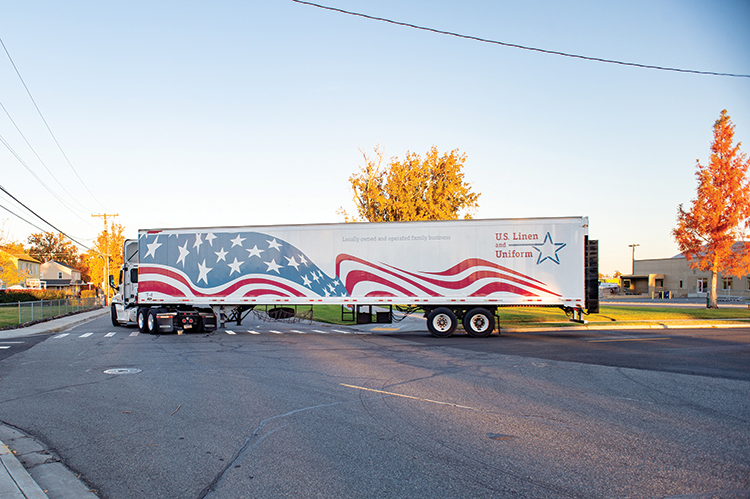
Home » Richland company continues to evolve to best serve customers
Richland company continues to evolve to best serve customers

May 14, 2020
When your company has been in business for 76 years, you’ve been doing something right.
You can expand and thrive during the best of economic times, and you adapt and become more flexible during the rough times.
With the coronavirus pandemic hindering almost all business, U.S. Linen and Uniform in Richland is finding ways to adapt.
“We’re in there delivering every week to businesses,” said Rick Snyder, owner and general manager for the family-owned business. “We’ve just got to have good communication with our customers. We are selling more janitorial supplies. On a lot of stuff, we just have to wait and get with the customer, see what they want.”
Snyder’s grandfather, Harvey Stoller, started the business. Then it was called Richland Laundry and Dry Cleaners Inc., with its first day of business on Aug. 14, 1944. It marked its 75th anniversary in 2019.
Stoller landed the federal contract to supply laundry services to the government town of Richland during World War II.
In 1958, Richland Laundry bought U.S. Laundry.
In 2007, the company’s corporate name changed to U.S. Linen and Laundry Inc. And in 2016, it bought a second production plant in Portland.
The company also has a retail embroidery and screen-printing store in Richland, called Sun West Sportswear.
Today, Stoller’s company is owned and managed by his family—daughter Pat Snyder and her husband Dan, grandchildren Debi Caldwell and Rick Snyder, and great-grandson Drew Snyder.
“We’ve had five generations in the business,” Rick Snyder said.
And technically, the family has been in the laundry business for 119 years.
Snyder’s great-grandfather started a laundry service in Walla Walla in 1901.
“We’re one of only five independent companies in this business in the entire state,” he said.

U.S. Linen and Uniform owns and rents out linens and uniforms to many businesses.
The company services the automotive, hospitality, food and food manufacturing, service, and medical industries.
Here’s some services U.S. Linen and Uniform provides:
- Plenty of options for work shirts, including dress and polo.
- Name and company logo plates.
- Work pants, jeans and shorts.
- Coveralls, coats and outerwear.
- Clothing that is flame resistant or has enhanced visibility.
- Patient gowns, hospital scrubs and lab coats.
- Towels and sheets.
- Chef garb, including shirts, coats and pants.
- Aprons, bagged towels and linens.
- Floor mats.
- Napkins and tablecloths.
- Mops, various types of paper towels, gloves and cleaning products.
U.S. Linen and Uniform has six distribution warehouses throughout the Northwest.
Besides the home base of Richland, it has locations in Yakima, Moses Lake, Spokane, Pendleton and Portland.
The pandemic has touched U.S. Linen, Snyder said.
“We bought a plant in Portland and we were building it up,” he said. “We’ve had to shut it down, and 50 of our 175 employees were laid off.”
And other parts of the business are down.
“All table linen business is pretty much gone,” Snyder said. “The bar towel and aprons business is down about 50 percent.”
U.S. Linen and Uniform also has dropped its policy of not handling customer-owned goods, such as uniforms and lab coats.
Normally, U.S. Linen and Uniform’s system tracks each garment because each piece has a radio frequency identification (RFID) chip in it.
With its Star Tracking System, U.S. Linen and Uniform can always find the garment. It does so through the process of cleaning, sorting, inspecting and mending (if needed) so the customer’s order is always correct.
It also has an app for quicker services.
By cleaning other customers’ uniforms not rented from U.S. Linen, there is a chance something could get lost since it doesn’t have the tracking technology.
“We didn’t want to process a company’s coats because it’s hard to keep track without the chips,” Snyder said.
But Snyder said he knew his company had to make that change to keep business going.
It is also looking at other potential sources for revenue, such as supplying cleaning supplies to industries paying more attention to the surfaces people touch.
“We’re taking care of linen,” he said. “We have been working on a hygienically clean certification. We’re meeting all the standards for that. In the soil room when the dirty clothes are there, we’ve been more careful handling things. Don’t shake things.”
He adds that a lot of what’s happened in the industry is going to be changing.
He used a car dealership as an example. A customer pointed out employees weren’t using masks or gloves and were touching the steering wheel of a vehicle without disinfecting it.
Snyder shared the observation with the dealership’s manager, prompting it to clean the surfaces employees touch.
“With the customer’s perception now, everything you touch you’re going to have to clean,” Snyder said. “Renting towels to car dealers and auto mechanics, I can see us selling them disinfectant also.”
Disinfectant and other cleaning products are going to likely be a bigger part of U.S. Linen’s service in the foreseeable future.
When restaurants eventually open for sit-down service, “they will start with half the tables. Those tables and seats will have to be extremely clean.”
But now, Snyder says, there is going to be a new way of looking at things.
“Tablecloths will be making a comeback. No one wants to touch a bare table now,” he said. “It shouldn’t already be on the table when they arrive. Silverware will probably have to be wrapped in a napkin. Plus, the salt and pepper shakers. That’s a big concern to many customers because they’ve been touched so much. Customers are going to want to know that everything is clean and sanitary.
“Disposable menus will be a thing. And lemon wedges are a concern.”
Lemon wedges? It’s true. Sometimes those sit out for people to use in their tea.
It’s Snyder’s job to think down the road of what is needed to keep this 76-year-old company going strong.
“We have to adapt to a new way of doing things,” he said. “And you have to take that to every business. The idea is giving the customer peace of mind. We deal business to business. But we’ve got to help provide that customer with that peace of mind.”
Business Profiles Local News
KEYWORDS may 2020





